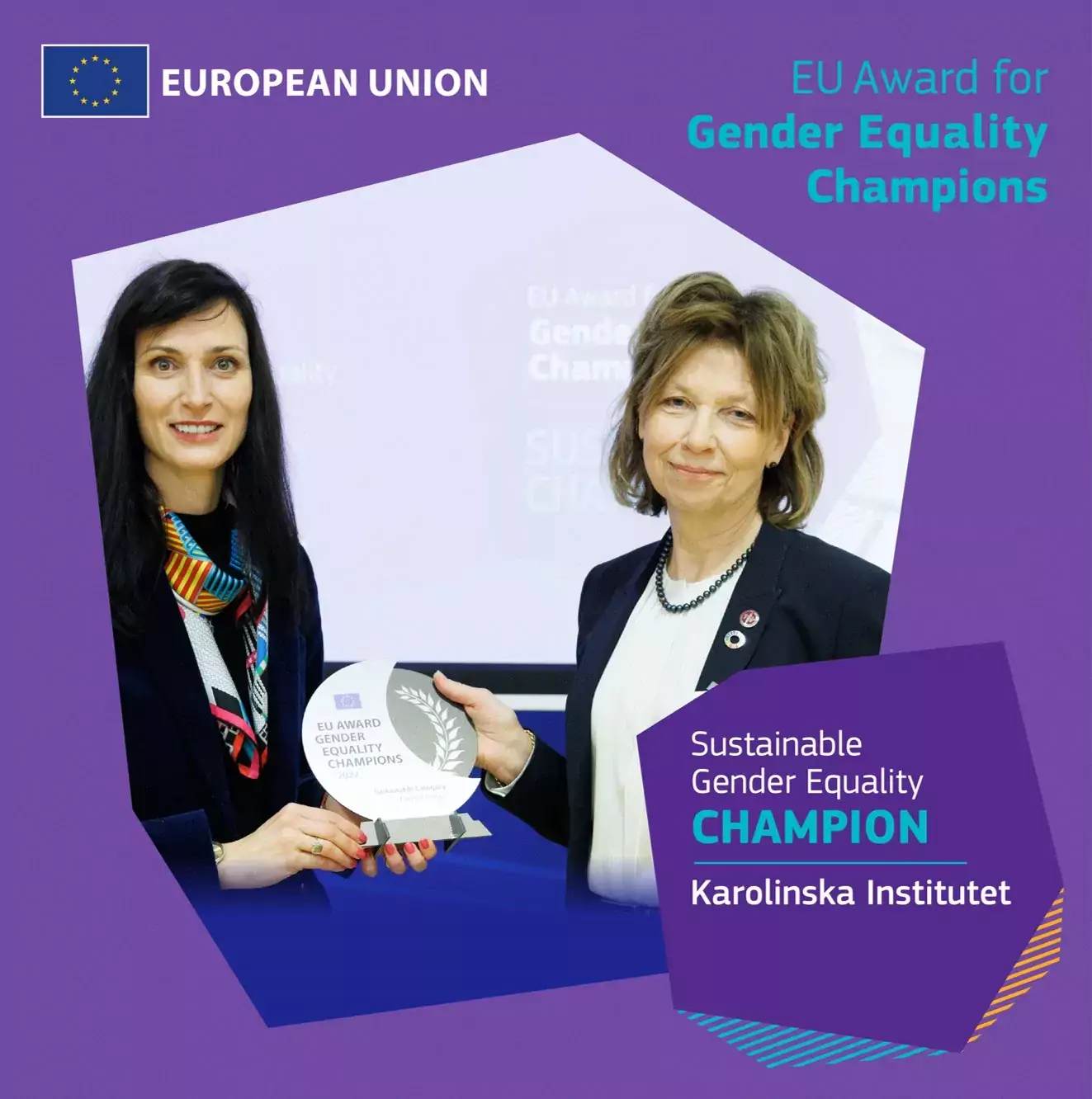About Equal Opportunities at KI
KI is one of the world’s leading medical universities. Our vision is to make a significant contribution to the improvement of human health. Our mission is to conduct research, to educate and to collaborate with society at large. In order to succeed in reaching these goals, our students and employees need to develop and thrive at KI, characterised by openness, creativity and curiosity.
It is by creating equal opportunities for everyone that we can develop our core activities and our work and study environments. Factors such as gender, transgender identity or expression, ethnicity, religion or other belief, disability, sexual orientation, age or socioeconomic status cannot be allowed to stand in the way.

KI role model for equality in EU – awarded for its long-term work
On March 8 2023, Karolinska Institutet was awarded a new EU prize for its long-term commitment to gender equality in higher education. The prize is the result of nearly 40 years of sustained activity to advance equal opportunities. The efforts have paid off and now KI is recognized as a role model for equality, a “Gender Equality Champion.”
- Read KI:s application to Gender Equality Champion.
- Read more about the award and the champions at the EU web site EU Award for Gender Equality Champions - Meet our EU Gender Equality Champions.
Laws, regulations, rules and commissions
The Swedish Higher Education Act and The Higher Education Ordinance
Section 5 in the Swedish Higher Education Act stipulates: In the course of their operations, higher education institutions shall promote sustainable development to assure for present and future generations a sound and healthy environment, economic and social welfare, and justice. Equality between women and men shall always be taken into account and promoted in the operations of higher education institutions.
The Higher Education Ordinance lists in Annex 2 the requirements to be fulfilled for the award of different educational programs. For a degree of Master of Science in Medicine the student must be able to:
- demonstrate both broad and specialised knowledge in the field of medicine and knowledge and understanding of the social circumstances that affect the health of individuals and groups, children as well as women and men
- demonstrate economic and organisational knowledge of significance for the health care services, and
- demonstrate knowledge of the relevant statutory provisions.
For a degree of Bachelor of Science in Nursing the student must be able to:
- demonstrate knowledge of social circumstances that affect the health of children, women and men, and
- demonstrate knowledge of the relevant statutory provisions.
Discrimination Act
The purpose of this Act is to combat discrimination and in other ways promote equal rights and opportunities regardless of sex, transgender identity or expression, ethnicity, religion or other belief, disability, sexual orientation or age.
Gender mainstreaming
The Swedish Government has commissioned Karolinska Institutet to work with gender mainstreaming. The use of gender mainstreaming as a strategy to reach the goals declared for Swedish gender equality policy dates back to 1994. According to the strategy, gender equality work must be integrated into the regular operations and not merely be dealt with as a separate, parallel track. For the work to have an impact and in order to reach the national gender equality goals, the organization must systematically highlight and analyze the impacts of various proposals and decisions for women and men, respectively.
Targeted areas:
- Leadership and leadership development
- Career development, recruitment and retention
- Assessment and allocation of funds and resource
- Gender perspective in development in education and pedagogy
Organisation and responsibility
- The Board of Karolinska Institutet and the President are ultimately responsible for goal-oriented work being pursued at KI.
- The Vice President is the management's representative in KI's equal opportunities issues and reports results and development needs to the President.
- The Academic Vice Presidents of education, doctoral education and research are ultimately responsible for goal-oriented work with equal opportunities being pursued within the area of each committee.
- Heads of Department, the University Director and the Chief Librarian are ultimately responsible for ensuring that goal-oriented work with equal opportunities is carried out at their respective departments, the professional services and the library.
Contact
At your department
Head of department, closest manager, administrative manager, safety representatives, equal treatment ombud, staff manager or other persons according to the delegation order of your institution.
For doctoral students
Director of doctoral education/coordinator at your department, ombudsperson, student health center, Previa, trade union organisations, such as SACO and SEKO.
Equal opportunities group at KI
Kristina Ullgren
CoordinatorMore information for logged in staff
There is more information for those of you working in the following groups
- C3.C3 Department of Physiology and Pharmacology
- C7.C7 Department of Learning, Informatics, Management and Ethics
- K1.K1 Department of Molecular Medicine and Surgery
- K8.K8 Department of Clinical Neuroscience
